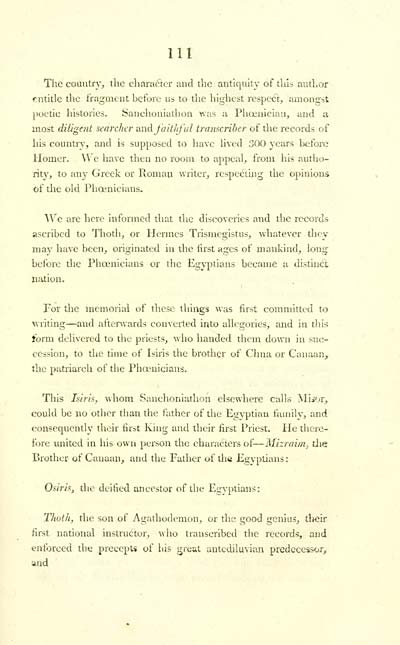Blair Collection > Celtic researches, on the origin, traditions & language, of the ancient Britons
(201)
Download files
Complete book:
Individual page:
Thumbnail gallery: Grid view | List view

Ill
The coimtrV;, the character and the antiquity of this author
rntitlc the fragment hcfore us to the higlicst respect, amongst
poetic histories. Sanehoniuthon i\as a Phuiuician, and a
most diligent searcher andj'aitl/fal tnmscriber of the records of
his country, and is supposed to have hvcd 300 years before
Homer. We liave then no room to appeal, from his autho-
rit\^, to any Greek or Roman writer^ respecting the opinions
of the old Phoinicians.
"We are here informed that the discoveries and the records
ascribed to Thoth, or Hermes Trismegistus, ΛvllateveΓ they
may have been, originated in the first ages of mankind, long
before the Phoenicians or the Egyptians became a distinct
nation.
For the memorial of these things was first committed to
writing — and afterwards converted into allegories, and in tlii;;
form delivered to the priests, who handed them down in suc-
cession, to the time of Isiris the brother of Chna or Canaan,
the patriarch of the PhcBnicians.
This Isiris, whom Sanchoniathon elsewhere calls Miior,
could be no other than the father of the Egyptian family, and
consequently their first King and their first Priest. He there-
fore imited in his own person the characters οϊ- — Mizroim, tiie
Brother of Canaan, and the Father of the Egyptians:
OiiV/s, die deified ancestor of the Egyptians:
Thoth, the son of Agathodemon, or the good genius, tîàcir
first national instructor, who transcribed the records, and
enforced the precepts pf his great antediluvian predecessor,
and
The coimtrV;, the character and the antiquity of this author
rntitlc the fragment hcfore us to the higlicst respect, amongst
poetic histories. Sanehoniuthon i\as a Phuiuician, and a
most diligent searcher andj'aitl/fal tnmscriber of the records of
his country, and is supposed to have hvcd 300 years before
Homer. We liave then no room to appeal, from his autho-
rit\^, to any Greek or Roman writer^ respecting the opinions
of the old Phoinicians.
"We are here informed that the discoveries and the records
ascribed to Thoth, or Hermes Trismegistus, ΛvllateveΓ they
may have been, originated in the first ages of mankind, long
before the Phoenicians or the Egyptians became a distinct
nation.
For the memorial of these things was first committed to
writing — and afterwards converted into allegories, and in tlii;;
form delivered to the priests, who handed them down in suc-
cession, to the time of Isiris the brother of Chna or Canaan,
the patriarch of the PhcBnicians.
This Isiris, whom Sanchoniathon elsewhere calls Miior,
could be no other than the father of the Egyptian family, and
consequently their first King and their first Priest. He there-
fore imited in his own person the characters οϊ- — Mizroim, tiie
Brother of Canaan, and the Father of the Egyptians:
OiiV/s, die deified ancestor of the Egyptians:
Thoth, the son of Agathodemon, or the good genius, tîàcir
first national instructor, who transcribed the records, and
enforced the precepts pf his great antediluvian predecessor,
and
Set display mode to: Large image | Transcription
Images and transcriptions on this page, including medium image downloads, may be used under the Creative Commons Attribution 4.0 International Licence unless otherwise stated. ![]()
| Early Gaelic Book Collections > Blair Collection > Celtic researches, on the origin, traditions & language, of the ancient Britons > (201) |
|---|
| Permanent URL | https://digital.nls.uk/75766095 |
|---|
| Description | A selection of books from a collection of more than 500 titles, mostly on religious and literary topics. Also includes some material dealing with other Celtic languages and societies. Collection created towards the end of the 19th century by Lady Evelyn Stewart Murray. |
|---|
| Description | Selected items from five 'Special and Named Printed Collections'. Includes books in Gaelic and other Celtic languages, works about the Gaels, their languages, literature, culture and history. |
|---|

